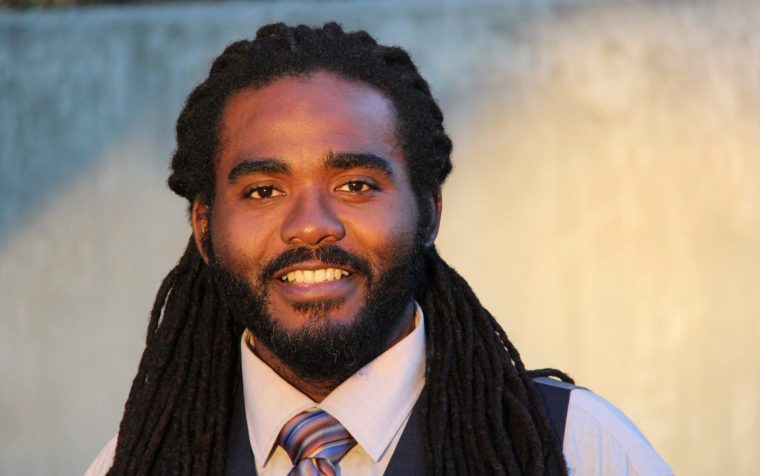Growing up in a single family home on welfare in Oakland, CA, Ashanti Branch never dreamed that he would become an educator. Today, as the Founder and Executive Director of Ever Forward Club, Ashanti looks back on his past and shares his dreams for the future—dreams of helping and supporting young men who come from backgrounds similar to his. He is already realizing this dream in a powerful way.
Krystal Goree: How did your background impact the creation of the Ever Forward (EF) Club?
Ashanti Branch: I created EF because it was something I always wanted—I wanted to have a place to be with other young men and talk about feelings. I wanted a place where there were mentors and men who had done things in their careers and I could ask questions about it, learn about it, and I could ponder things I wanted to do without other people squashing my dreams because their dreams were limited. And I wanted to have a place where it was okay to be an emotional person. I was an emotional kid. I grew up having to be emotionally responsible really early, so I think that when I created EF—although I did not know this when I created it—it was something I so wish that I had had in high school. In high school, I was high achieving. I was on track, but I could not talk about my goals and things like that with a lot of people. They were dream killers. There were a couple of people in my class who I could quietly ask questions like, “Hey, what do you think about going to college?” And, then, I would go back to my other friends and just talk about things that they wanted to talk about. I did not have a place where I could just say things like, “I am going to go to a place where I can study engineering, and I am going to be ‘rich.’” For most people I grew up with, if you weren’t an athlete or you weren’t a rapper, first of all, you weren’t going to be rich because no one knew any other careers and, two, no one wanted to hear about it because that is not what was cool to them. I created EF because as a youngster, that was something I really wanted, and as a teacher, that is what I saw was really needed.
KG: You referred to middle school as being a really difficult time in life for you in particular. Do you think that middle school is the best time to introduce young men to an opportunity like EF because they are more open to it? Should we back it up and expose them to this type of experience at an earlier age? Is high school too late?
AB: EF is at all three levels now. We work with fourth and fifth grades in elementary, as well as with middle school and high school. I began my career teaching in high school. I knew early on that students were coming to me in high school not ready for the rigor or high school. I was just a teacher. I was not dreaming about starting a nonprofit.
When I started EF in 2004, there was not a big movement around social and emotional learning. People were actually shocked when I wanted to start a club for boys. There was not a lot of talk about what boys need because people were still saying we need to help the girls to balance out the playing field. But really, the challenges for the boys were so great in terms of behavior, in terms of fighting, in terms of gangs, in terms of drugs, in terms of violence. All the things that were creating chaos in the schools were coming from the boys.
When I started EF in high school it was just because that is where I was at. I was just a teacher saying these boys need support. And, when I went to the middle school, I was just trying to get the hang of being a vice principal and then the woman who was in charge of the sixth grade said, “Ashanti, I need some help with these boys. There are a bunch of boys who are struggling.” And it just happened. It was just like . . . That is my work. It was so clear that they need help. And, when they came into sixth grade with this belief about exactly what it meant to be a man and what it means to be cool what it means to be tough . . . they were less mature, so they were doing it in really ugly ways. At the high school, it was a little more subtle even though it is sort of abrupt. They are older. In middle school, their filters are so weak so they just blab stuff out of their mouth that they have learned from their uncles, fathers, TV, video games, movies. They are trying to figure out who they are but they are also pressured into conforming. They have been pressured into a very finite definition of what it means to be a man. That is when I realized that there is some work that needs to be done in elementary and how do we do that.
We hear from parents of second and third graders that other kids are calling their sons gay because they are having lunch with their best friend and they are sharing lunch. They are already being pressured in second grade to believe that you can’t be friends with another boy in second grade and share lunch because you have been told so by some bigger boy. So, now these two young boys who are really just good friends are confused about what it even means to be friends. They do not even know what it means to be gay, but they know that it does not feel good the way the other boys talk about them. The early pressure is so real.
Parents ask, “How do you let your loving, caring boy just be himself and not have to pretend so early that he doesn’t want to have relationship with other boys?” We have communicated to young men that if two boys want to have a true and meaningful relationship that it must be sexual. They think if there is intimacy, there must be sex.
In EF, we say that intimacy means “in to me see,” and I want you to see me, I want you to know who I am. Our boys need it and they want friendships, but they have been told that they should not have good friendships, so they have this internal battle. You can’t be friendly because if you are friendly and have feelings you are not a man, because men do not have a lot of feelings. Or they don’t show feelings.
So, if you are a little boy and you never see your father or your uncle talk about feelings, and they say to you, “Just suck it up, just deal with it, man up,” then this tells you a lot of things that conform you. Our boys begin to get mixed messages.
KG: You share the story of a teacher who pulled you aside in middle school and said to you, “You are smart, but you don’t act like it.” She also told you that life does not give you what you want, it gives you what you get, and you have to make the most of it. You identified that as a life-changing moment. What was it, if anything, about that teacher or what kind of relationship did you have with her that provided the opportunity for her to make that difference in your life?
AB: That was Ms. BP and what was there before is that we had a connection. I really liked her class—well, I didn’t like her class because I didn’t like English, but I liked HER. She was nice, and she would have like these impromptu or unofficial field trips. . . . I really didn’t have any money so I usually couldn’t go, but when I could go it was amazing. She would say, “This Saturday, I am going to this museum in San Francisco, I’ll be at the [metro] at 10:00 a.m., if you want to come, you can follow me.” And that was it. People would say, “Is she serious?” So, one time, a couple of us got to go. She did not pay for anything. It was not an official field trip. She just told us that she was going to this cool museum and if we wanted to go, we could. So on these cool trips, I remember seeing this teacher as more than just at teacher—like a human—and it was just a connection. It was a teacher who wanted more out of us, and it was just amazing. She invited us to come into her life and see what she did on the weekends, right?
One time, I got in trouble in her class for yelling out. I had this buddy who put a tack in my chair and when I sat on it, it hurt. That is why I was yelling. And she said, “Why are you yelling in my class?” I told her that he put a tack in my chair. She said, “I don’t care.” And, she gave me detention and I was like “Aw! How dare you!” (I was a hothead in middle school.) And I went to detention thinking, “I am never going to talk to you again. That was not even my fault and you give me detention?” In detention she was blabbing, and I was not listening, but I did hear one thing. She said, “I know that you are sad because your father died before you were born.”
I heard that because I needed to correct her. There are some things you cannot be as a boy growing up in Oakland, and sad is one of them. I wanted to make sure that she never said that I was sad. I was not sad. Being sad would have meant that I was weak. I was mad, I was angry. I trusted her. Even though I had been put into detention, she was somebody who I trusted and who I had a relationship with and who I had even interacted with out of school. She was a person who I knew cared about me. So, even though she had gotten on my case, I was like, “Yeah! I get it. You are not just getting on me because you do not like me or you hate me.”
KG: So, establishing a relationship is important.
AB: Absolutely.
KG: On your website it says that many young men are underschooled, deschooled, or overschooled. Can you explain this?
AB: Yes. As I go around and talk to young men, I find that some them love school, but many of them really do not want to be at school at all. There are clubs out there for young men who want to go to college, who are interested in the arts, and stuff like that. But, there is not a club out there for young men who don’t want to be at school. They go to school because there is a law that says they have to go to school but there’s the pressure of learning.
If you have trouble learning, they give you more remedial classes—they would give you more classes. Like students who are not doing well in math would have to go to two math classes instead of one. We learned that some of the young men were overschooled. They were going to school all the time and getting irritated by it, or school was boring to them and nobody would explain to them why they had to learn this stuff.
They would ask, “When are we going to have to draw a parabola?” And I was like, “You may never have to draw a parabola, but you may have to solve a problem. You may have to solve a problem that you do not now how to deal with and you may have to be creative to solve it. You may never have to solve a problem like a parabola, but I do know that you are going to have to solve problems, and if you do not know how to solve problems life is going to kick you HARD, harder, and harder. And I am trying to help you recognize that when it gets hard, you don’t quit. When it gets hard, you figure out how to work hard on it.”
“I am not here to make you love algebra. I love algebra, and I would like you to find a love for algebra, but I want you to learn how to solve problems because the world needs more people who know how to solve problems.”
The ones who loved school, we helped to find more ways to get involved so that school would not be just a boring thing every day. For those who didn’t like school, we said, “Hey, how can we make school exciting for you? What are some things that you are interested in? How can we come up with a win win?” You are going to have to do some things that you don’t really like to do but you are also going to have the opportunity to do things that you really like to do.
There are all kinds of kids who come to school. Some of them like school. Some of them do not like school. A lot of teachers get upset when kids don’t like their subjects. But its kind of like exercising. You may not like exercising, but you need to exercise to keep fit. There are some things you may not like to do but we do them because they are necessary. This is new language.
KG: One of the things that I have struggled with is that we would get kids in a gifted program and then they would want to leave. It did not meet their needs. What can we do for really bright kids who feel like its not cool to do good in school? What are three things that we could start with to help those kids to open their hearts to those of us that really care?
AB: Sometimes it is being able to help them where they are. In the community that I grew up in, being smart is not cool. The kids who were smart are called nerds and geeks and teachers’ pets. It depends on the school. In some schools, the smart kids get a lot of props, but in a lot of the urban schools that I have been in, you can get pretty good grades but you can’t be too smart because the cool kids are the athletes. The athletes get all the credit.
They have got to leave their regular class to go to a class for smart kids. Everyone knows why they are leaving. [The mindset becomes] “I am going to a class where the smart kids go and I have a group of friends who think that being smart is not cool and I am not going to go.” . . . One of the biggest challenges is to be isolated from your friends. . . . Your friends may be upset because they didn’t get invited. It could be jealousy. But your friends are not going to say that. They are going to say, “Don’t go to that class. Stay here with us.” It is kind of like crabs in a bucket. You can probably get out, but you have to be careful because sometimes the other crabs will drag you back. It is not with the intention of hurting you, but it is because they have a belief about what it means to be in “that” group. There is just a lot of pressure.
When we started EF, we had a meeting once a week for 40 minutes and members were expected to attend the meetings every week. Where I was teaching, there was a big tree outside where gang members or wannabe gang members would hang out. We would be having a meeting, and I would ask “Where is _____?” And the kids at the meeting would say, “Oh, he is out hanging by the tree.” I’d go over to the tree. He was there, and I’d tell him to come with me. The other kids at the tree were like, “Where are you going? Where are you taking him?” I answered, “We have something we need to take care of.” I didn’t always chase them, but I did let them know that if they wanted to be part of the EF group, they needed to attend the meetings every week. They could do what they wanted all during the rest of the week, but during those 40 minutes, you needed to be at the meeting because you are valuable and because your presence means something.
When they would be absent for a day, they would come back to school and no one would ask, “Are you okay? Was there a death in the family? Were you sick?” All they would ask is “Where is your slip?” In the EF club, I made it a priority that if someone did not show up, they were going to get a phone call, they were going to get a house visit, or the other young men were going to let them know, “DON’T MISS MEETINGS.” In EF, they get our support and they know we care. Knowing that your presence matters is valuable, and I don’t think they get that at home sometimes.
[It’s about] providing them a safe space, building relationships, making connections, recognizing their value.
KG: You said that for the program to be successful, you had to work with parents, teachers, and administrators to get them involved and include them as stakeholders. How did you do that?
AB: Our model is evolving now. When I started EF, I actually believed that I did not need anybody’s help. When I first told the principal about my idea, she liked the idea and told me to let her know how she could help. Well, I was just trying something. I did not know if it was going to work. I just knew that there was more going on with our young men than bad grades. They were smart.
The administrators—I just wanted them out of my way. I didn’t want it to be mandatory. I wanted the kids to want to be at school. I wanted school to be fun. [But] I then needed to have some people from the administration, a teacher who was going to say, “I advocate for this.”
It was easy for me to talk to teachers because I have been a teacher, I have been an administrator, so I know the language. Nonprofits that have a good program but do not know the school language . . . are going to suffer some. This is hard when you go to a school to talk to principals who are tired, have already been to seven meetings that week, but know that the data on the young men at the campus show that they are struggling. We needed for them to see why it was important for them to invest in some intervention and support.
. . . Now, we are letting young men take the initiative to start clubs. There is no reason for the kids to suffer because they are not able to get school or administrative support. So, this year, we are prototyping letting young men all over the country start their own Ever Forward Club, using the club model at their school (they have to follow the rules at their school). We will give them the support, the contacts, and will let them know here are the things that your school needs to invest in. We are trying the new model this year and, already, we are having some really good success around it with a lot of young men. There are some young men who want to be a part of a brotherhood, and they should not suffer because their administration wants to buy a boxed kit of some kind where they can check a box and say, “We did that.” And it has no meaning, no value, no benefits to the student body.
KG: You describe your talk as a kinesthetic keynote. Can you give us a little summary of what participants can expect?
AB: I don’t want you to sit and listen to me the whole time. I have things to say and I have experiences that I believe will help to deepen your connection to why you are in this work. And, if you have gotten to a place in your work where you are trying to find the fire again, I believe that the talk will help to reinvigorate your fire. [But] in my type of learning and my type of teaching and my type of experiential talks, I want people to leave there not only with information in their head but also reminder of connecting to their heart. You are smart. I am not here to prove to you how smart I am by putting a bunch of stuff in your head. What I am hoping is that you can connect to your heart because . . . when you can connect to your heart, you can see why that student may be disconnecting from that class or that homework assignment, and you can connect [to that student] I believe that we can help young people do incredible things. That’s my charge, that’s my goal.
I am not into teaching because I was an engineer. I am not into teaching because I went to Stanford. I’m here because teaching called me, and I am trying to get better and better and better at it every day. Even though I don’t teach in a classroom, I feel that my heart is being an educator and helping people learn. That is how I describe it.
. . . My ultimate goal for people is that their experience is about changing lives and if it doesn’t change the lives of the educators, then, hopefully, it will help the educators change the lives of our young people. We have a generation that needs to be seen—to be heard. With the world of social media, we need more people who can look each other in the eye and see each other and that is our goal in this work.





